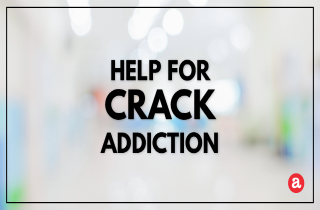If you’re addicted to crack, you might feel that the cycle will never end. In fact, how crack works on the brain makes compulsion and craving very strong, as crack addictive qualities are known to be the strongest of all drugs. But the good news is that effective treatment can end crack addiction. Treatment comes primarily through a combination of medical and behavioral therapies, but crack addiction mostly responds to behavioral therapy.
Here, we review resources that can be used to get help for those people who are showing signs of crack addiction. More on asking for help for crack addiction and where to find it here. Plus, a section at the end for your questions about crack addiction help.
How to help crack addiction
Crack addiction treatment is available, and, yes, treating crack addiction does work. You just have to remember that as a chronic and relapsing brain sickness, addiction is defined by an extreme desire for crack, which is due to long-term imbalances in brain chemistry. Studies have determined that treating crack dependency is effective by lessening drug use by 50%. Then, you can get better with a mix of drug and behavioral therapy.
Chemical dependency is extremely common among crack users. Some clinicians believe that one-tenth of recreational crack users proceed to heavy use of the substance. Abusers are going to find it very challenging to cut down on their crack usage and tend to build up a tolerance to the drug. This requires bigger amounts of crack to get the once-satisfying, same effects. There are three main ways to get help for crack addiction. The main types of crack addiction treatment include:
1. Crack withdrawal treatment – Withdrawal from crack can involve the intramuscular administration of flupenthixol decanoate, which, according to a report, seemed to reduce crack cravings. Otherwise, a period of extreme fatigue is characteristic of crack withdrawal.
2. Physical stabilization – Physical stabilization refers to making sure the body is functional again after the use of crack has stopped. Long term use of crack can lead to protracted withdrawal symptoms or PAWS, such as depression. Treatment in the phase after acute cocaine withdrawal involves the administration of mild prescription medications such as antidepressants to ease the severity of these PAWS withdrawal symptoms.
3. Psychological crack addiction treatment – Psychological treatment for crack addiction addresses the reasons why you use crack. There are various psychological issues that compel people to use crack. Peer pressure among kids in school is a big reason, while stress reduction and even a symbolic rebellion against authority are also factors. Of course, other psychological issues that compel use include past trauma or the sheer pleasure of the drug. Abusers seek better confidence, greater highs and improved energy. Psychological help for crack addiction involves relapse prevention methods, education materials, individual therapy procedures and family systems materials.
Getting help for crack addiction
Getting help for crack addiction involves getting in touch with addiction professionals and organizations that specialize in crack addiction treatment. Here are places or people from which you can get help:
- Addiction specialists
- Crack addiction treatment centers
- Family doctor
- Friends and family
- National Clearinghouse for Drug and Alcohol Information
- Psychologists
- Psychiatrists
- Religious or community leaders
- Social worker
How to help a crack addict
You can help a crack addict with either an informal or a formal crack addiction intervention. During an informal intervention, loved ones of a crack addict usually confront him/her without any planning, in an impromptu fashion because a good situation has arisen for a talk about his crack addiction. During a formal intervention, loved ones plan the intervention in such a way to collectively confront the addict in a controlled setting. A counselor may also be present, and this is usually the last resort for a crack addict after other attempts to reach him have failed.
However, it is crucial that friends and family members stop being enablers by stopping behavior and habits that promote the continued crack use by the addict. This includes stopping giving them money to purchase the drug in the first place! Or allowing a crack addict to stay in the home. Additionally, you can help a crack addict by seeking outside professional help. There are also various kinds of therapies to help those enduring a crack addiction. Some examples are individual counseling, family therapy, support groups, and 12-step groups.
Crack addiction help and helplines
There are a number of crack addiction helplines that you can rely on to start the process of healing and becoming clean.
The 24-Hour Cocaine Hotline at 1-800-992-9239. This is the number for a hotline that features understanding and supportive listeners.
The Crack Treatment Hotline at 1-866-925-4032. This is the helpline for the Crack Treatment Hotline.
The Drug Abuse Hotline at 1-800-662-HELP. This is a government hotline to help you find treatment.
Help with crack addiction questions
Do you still have questions about getting help for crack addiction? Please don’t hesitate to ask us! You can ask questions in the comments section. We’ll get to them as soon as possible.









Related Posts